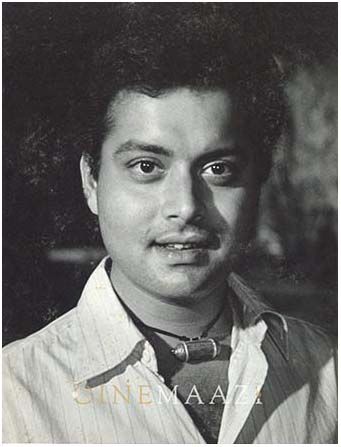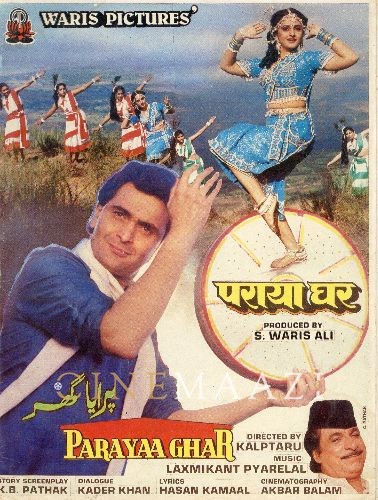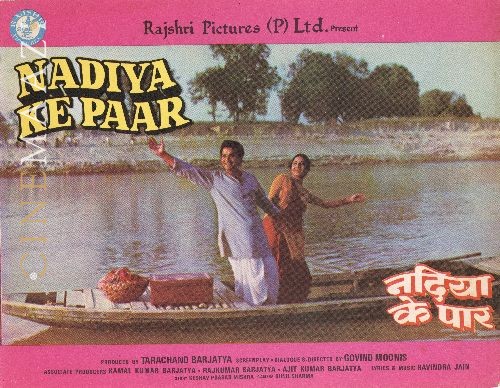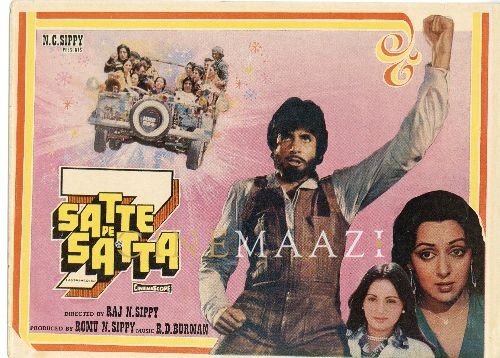Sachin Pilgaonkar

Subscribe to read full article
This section is for paid subscribers only. Our subscription is only $37/- for one full year.
You get unlimited access to all paid section and features on the website with this subscription.
Not ready for a full subscription?
You can access this article for $2 , and have it saved to your account for one year.
- Born: 17 August, 1957 (Bombay)
- Primary Cinema: Hindi
- Parents: Sharad Pilgaonkar
- Spouse: Supriya Pilgaonkar
- Children: Shriya Pilgaonkar
"His style marks a particular kind of sensitivity that is best reflected through his acting and treatment of films. He is one of those sensitive people whose work is laced with emotion and passion. He is a keen observer of human relationships and his films and entire work reflect the same. He is no doubt one of the most versatile actors of the Indian film industry.” Director Ramesh Sippy had thus analyzed the approach and technique of film and television actor, director, singer and producer, Sachin Pilgaonkar. Known mononymously as Sachin, he is popular for films such as Geet Gaata Chal (1975), Balika Badhu (1976), Ankhiyon Ke Jharokhon Se (1978), and Nadiya Ke Paar (1982). A successful child artist who worked in several films such as Ha Mazha Marg Eekla (1963), Dak Ghar (1965), and Bachpan (1970), he went on to make his mark in leading roles and character roles in Hindi and Marathi films such as Trishul (1978), Judaai (1980), Satte Pe Satta (1982), Avtaar (1983), Gammat Jammat (1987), Ghar Ek Mandir (1988), Aayatya Gharat Gharoba (1991), Navra Maza Navsacha (2004), Katyar Kaljat Ghusali (2015), Hichki (2018), and Sohala (2018). He has also directed successful Marathi films such as Mai Baap (1982), Navri Mile Navryala (1984), Ashi Hi Banwa Banwi (1988), Aamchya Sarkhe Aamich (1990), and Navra Mazha Navsacha (2004). His career in television has also seen him produce, direct and act in hit comedy shows such as Tu Tu Main Main (2000) and Kadvee Khatti Meethi (2006). A competent actor and dancer, Sachin was unable to establish himself as a mainstream Hindi film star and largely played supporting characters in big banner films like Sholay (1975), Trishul (1978), and Satte Pe Satta (1982). He built a successful career as a producer-director of television shows and Marathi films.
Born on 17 August 1957 in Bombay into a family hailing from Pilagaon, Goa, his father Sharad Pilgaonkar managed a printing business. Sachin was just 4 when he ventured into films as a child artist. Set to act in Madhavrao Shinde's film Soonbai (1961), he however made his debut in Raja Paranjape's Marathi film, Ha Maza Marg Ekla (1962). The film starred Seema Deo, Jeevankala, and Reema Lagoo. Sachin won the National Film Award for Best Child Artist for his performance, receiving the honor at the hands of the then President of India, Dr. Sarvepalli Radhakrishnan.
Featuring as a child actor in numerous films, he acted in Hrishikesh Mukherjee’s Majhli Didi (1967), Jewel Thief (1967), Chanda Aur Bijli (1969), Brahmachari (1968), and Mela (1971). He was often paired with another child actor Naeem Sayyed (known better as Junior Mehmood), doing as many as 15 films together as child artist.
Sachin made his debut as a lead actor with Rajshri Productions' Geet Gaata Chal (1975). He was cast opposite Sarika. Directed by Hiren Nag, the film told the story of Durga Babu, and his wife, Ganga, who come across Shyam (Sachin), an orphan, who sings and dances on special occasions. They decide to take him home. Shyam meets with their daughter, Radha (Sarika). She slowly falls in love with him, but he believes that she just wants to be friends. In his eyes, Shyam wants to be a free person, not tied down to anyone or anything and would like to spend the rest of his life wandering, singing, and dancing. When he discovers that the family intends to get him married, he likens his plight to that of a caged bird, and flees, breaking Radha's heart. The film became a hit, establishing Sachin and Sarika as a successful lead pair. Following Geet Gata Chal, Sachin featured in several successful bittersweet dramas produced by Rajshri Films in the 1970s and early 1980s such as Balika Badhu (1976), Ankhiyon Ke Jharokon Se (1978), and Nadiya Ke Paar (1982).
Unable to make further strides in Hindi films as a lead actor, he made the shift to supporting roles in films such as Trishul, Sholay, Avtaar, Sur Sangam (1985), and Satte Pe Satta. He went on to pick up the director’s baton, directing several hit Marathi films starting with Mai Baap (1982), Navri Mile Navryala (1984), Ashi Hi Banwa Banwi (1988), and Amchyasarkhe Aamich (1990). Mai Baap (1982) received critical acclaim. Also featuring Sanjay Jog, Priya Tendulkar, Ashok Saraf, and Daya Dongre along with Sachin, the film depicted the tale of Madhavrao Patil who is framed for the murder of his employer. His children Ravi, Chandu, and Suman subsequently face hardships in their life. Ravi disowns his family for a comfortable life in the city. Chandu then teams up with Gunwant, a moneylender, and they decide to teach Ravi a lesson. Commercial success came with Navri Mile Navryala. Sachin’s subsequent directorials Gammat Jammat and Maza Pati Karodpati established his credentials in the Marathi film industry, while further success unfolded with Ashi Hi Banwa Banwi. The film, starring Sachin himself alongside popular actors Ashok Saraf and Laxmikant Berde, was a big hit. He also explored experimental cinema. With his comedy film Amchyasarkhe Aamhich, he delivered another hit. His recent Ashi Hi Ashiqui (2018) featured Laxmikant Berde's son, Abinay Berde.
Sachin also directed Hindi films such as Subhash Ghai's Prem Deewane (1992), Aisi Bhi Kya Jaldi Hai (1996), and Jaana Pehchana (2011), a sequel to his earlier blockbuster Ankhiyon Ke Jharokhon Se.
Turning his focus to television in the 1990s, he directed the Hindi comedy show Tu Tu Main Main starring his wife Supriya and Reema Lagoo. Revolving around the arguments, and love and hate between a daughter-in-law and mother-in-law, the show was a hit. He also directed Rin 1 2 3, which parodied Hindi films. His sitcom, Hadh Kar Di starred Dara Singh. He also anchored Hindi music shows like Chalti Ka Naam Antakshari, reality comedy talent show Chhote Miyan, and various other events and Marathi film award ceremonies. In 2006, he and his wife Supriya won the Hindi dance reality show Nach Baliye, beating 9 other celebrity contestant pairs. His program Eka Peksha Ek focused on finding hidden talent from across Maharashtra in the field of dance.
Sachin penned a ghazal Badal jo ghir ke aaye under the pseudonym of Shafaq for director Govind Nihalani's directorial debut in Marathi - Ti Ani Titar (2017).
Among the awards he has received are the National Film Award for Best Child Artist for Ha Maza Marg Ekla (1962), National Film Award for Best Child Artist for Ajab Tuje Sarkar (1971), and the Filmfare Marathi award for Best Actor for the film Katyar Kaljat Ghusli (2015). He essayed the larger-than-life character of Khasaheb Aftab Hussain in the latter.
The year 2017 saw the release of Sachin’s autobiography titled Hach Maza Marg. It marked the completion of 50 years of his film career. The book is not simply an autobiography of a star tracing his personal life, but through its anecdotal style of narration, it provides certain insights into a long phase in the history of the Indian cinema industry, which saw the rise of the star system, how some eminent directors worked, advances in technology, production of some successful films, and novel promotional techniques.
Married to actress Supriya Pilgaonkar, whom he first directed for his debut Marathi film, Navri Mile Navryala (1984), they became a successful onscreen pair in Marathi cinema. Their daughter, Shriya Pilgaonkar is also an actress.
References
-
Filmography (41)
SortRole
-

Saazish 1998
-

Parayaa Ghar 1989
-

Pyar Ka Mandir 1988
-

Maa Beti 1987
-

Maashuka 1987
-

Aaj Ka Daur 1985
-

Ghar Dwaar 1985
-

Nadiya Ke Paar 1982
-

Satte Pe Satta 1982
-

Krodhi 1981
-

Judaai 1980
-








.jpg)



